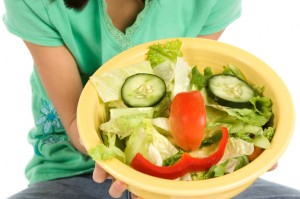 I often talk to concerned parents who are worried that their kids have become or want to become ‘vegetarian’. They are mostly concerned about the kids not getting adequate calories, nutrients, and also not getting enough choices while eating outside the home. Vegetarianism has become increasingly popular in kids in the last decade. According to a 2010 national poll by the Vegetarian Resource group, about 1.4 million people between ages 8 and 18 are vegetarian-that is, they avoid meat, fish and poultry. Kids or families may adopt a vegetarian diet for a variety of reasons such as health, cultural, or other reasons. Older kids may decide to become vegetarians because of concern for animals, the environment, or their own health. Celebrities popularizing vegetarian diets may also influence some teenagers to follow the same.
I often talk to concerned parents who are worried that their kids have become or want to become ‘vegetarian’. They are mostly concerned about the kids not getting adequate calories, nutrients, and also not getting enough choices while eating outside the home. Vegetarianism has become increasingly popular in kids in the last decade. According to a 2010 national poll by the Vegetarian Resource group, about 1.4 million people between ages 8 and 18 are vegetarian-that is, they avoid meat, fish and poultry. Kids or families may adopt a vegetarian diet for a variety of reasons such as health, cultural, or other reasons. Older kids may decide to become vegetarians because of concern for animals, the environment, or their own health. Celebrities popularizing vegetarian diets may also influence some teenagers to follow the same.
Vegetarian diets tend to be high in fiber and polyunsaturated fat, and low in cholesterol and calories. However, there are certain nutritional deficiencies that can easily occur with a vegetarian diet that need to be addressed, which is also dependent on the type of diet adopted. Common vegetarian diets are –
- lacto-ovo vegetarian: eats no meat, poultry, or fish, but does eat eggs and dairy products (the most common “vegetarian” diet )
- lacto-vegetarian: eats no meat, poultry, fish, or eggs, but does eat dairy products
- ovo-vegetarian: eats no meat, poultry, fish, or dairy products, but does eat eggs
- Pesco-vegetarian: eats fish, fruits, nut, grins and vegetables
- vegan diet: eats only plant-based foods
- Semi-vegetarians: eat everything except red meat
Children can be nourished well on all kinds of vegetarian diets as long as care is taken to incorporate sources of protein and certain vitamins and minerals that are commonly found in ‘non-vegetarian’ diets. Depending on the type of vegetarian diet chosen, kids may miss out on some of these important nutrients if the diet is not monitored. Calcium and Vitamin-D insufficiencies can occur easily when milk products are eliminated from the diet. Iron, Zinc, Vitamin B12 are commonly found in meat and have to be replaced from carefully chosen vegetarian sources. Here are some sources of nutrients that vegetarians should consider in order to prevent deficiencies –
- vitamin D: milk, vitamin D-fortified orange juice, and other vitamin D-fortified products
- calcium: dairy products, dark green leafy vegetables, broccoli, dried beans, and calcium-fortified products, including orange juice, soy and rice drinks, and cereals
- protein: dairy products, eggs, tofu and other soy products, dried beans, and nuts
- iron: eggs, dried beans, dried fruits, whole grains, leafy green vegetables, and iron-fortified cereals and bread
- zinc: wheat germ, nuts, fortified cereal, dried beans, and pumpkin seeds
- vitamin B12: dairy products, eggs, and vitamin-fortified products, such as cereals, breads, and soy and rice drinks, and nutritional yeast
Depending on your child’s age, vegetarian diets may need to be carefully planned to meet nutritional demands of the growing child.
Infants: Breast milk and/or formula are the main sources of nutrition in the first six months of life. Exclusively breastfed infants should receive a source of vitamin B12 if the mother’s diet isn’t supplemented. Breastfed infants 6 months and older should receive iron from complementary foods, such as iron-fortified infant cereal. Once an infant is introduced to solid foods, protein-rich vegetarian foods such as pureed tofu, cottage cheese, yogurt or soy yogurt and pureed and strained legumes (such as beans, peas, chickpeas, and lentils) are necessary to maintain nutrition.
Toddlers: A vegan diet may not offer growing toddlers enough essential vitamins and minerals, such as vitamin D, vitamin B12, iron, calcium, and zinc. So it’s important to serve fortified cereals and nutrient-dense foods. Vitamin supplementation is recommended for young children whose diets may not provide adequate nutrients. Toddlers who are generally picky eaters may also not get enough calories form a vegetarian diet resulting in weight loss, poor growth and nutritional deficiencies.
Older kids and teens: A lacto-ovo vegetarian diet which includes eggs and dairy products may make it easier to meet the nutritional requirements of a growing teen. However stricter diets such as vegan diets have to be addressed by a parent who should evaluate options to replace the dietary requirement of calcium, Vitamin D, Iron etc. DHA, an omega-3 fatty acid found in certain types of fish, is important for brain and vision development in young children. Look for DHA fortified foods and juices. Talk to your teen about the lunch options at school to ensure that a balanced diet is being consumed. Make sure that there are no other red flags suggestive of eating disorders in a teen who has started eliminating foods from his/her diet, citing vegetarianism. Also, the concept of a healthy vegetarian diet for a teen could mean French fries and soda! So, discuss in detail what your teen is choosing to eat at school.
Overall, the more restricted the diet, the more difficult it is for vegetarian children to get all of the nutrients they need. However, a vegetarian diet can be a healthy choice for kids, as long as it’s properly planned. Make sure you avoid the two most common pitfalls with raising ‘vegetarian kids’- make sure you replace the nutritional value when you/the kids take the meat off the plate. And avoid overcompensating with a diet that is too high in saturated fat and calories, from worry of not feeding the child enough calories and protein. A basic knowledge of nutritional needs, sources, and replacement options can help create a well-balanced vegetarian diet. Talk to your pediatrician or a nutritionist about diet and vitamin supplements. Vegetarianism can be a way of healthy lifestyle as long as you replace what you omit.





Comments